8 Whole Foods Items You Should Never Buy, According to Customers
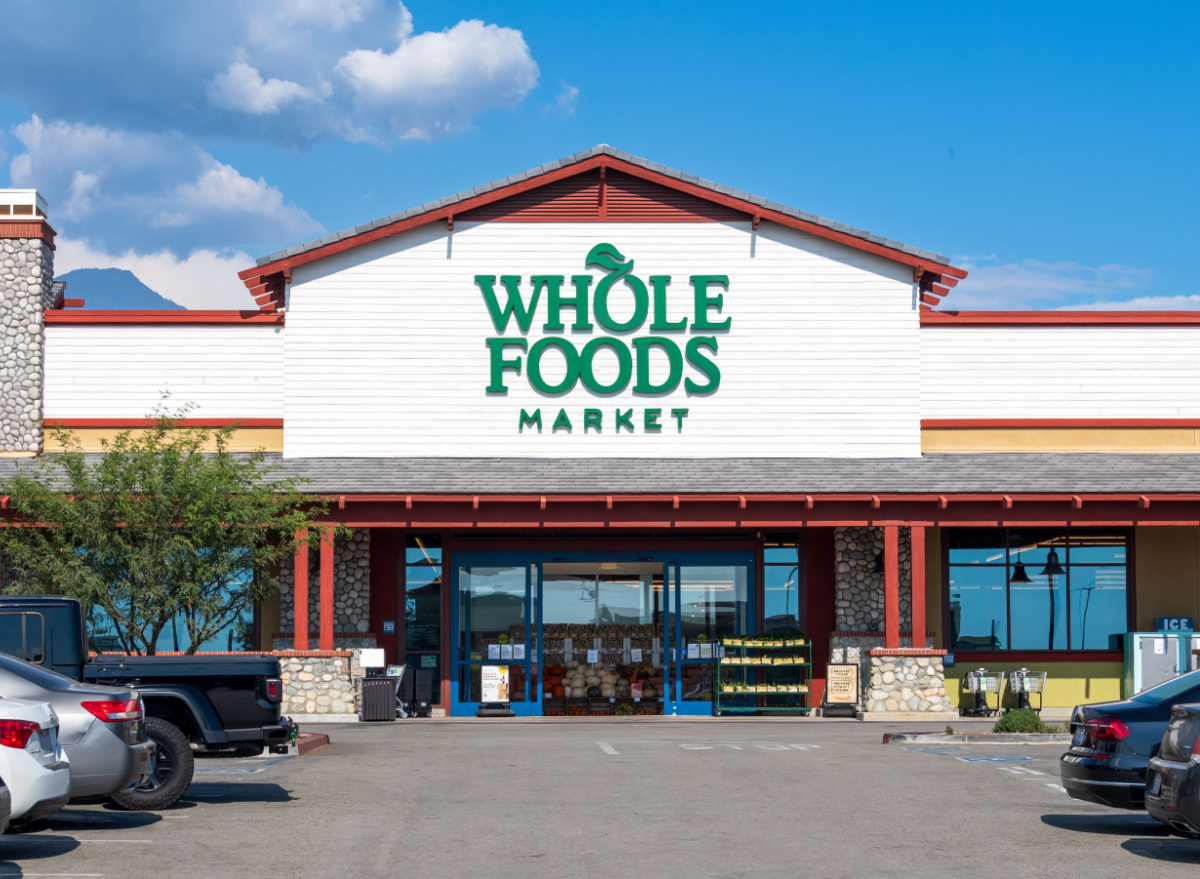
Popular organic grocer Whole Foods Market brings in millions of customers looking for high-quality foods and products. When you’re shopping for responsibly sourced meat, fish, fresh produce, and eco-friendly household products, many will say there’s no better place than the Amazon-owned retailer.
However, if you’re going for top-tier quality, you’re also likely to pay top dollar. Over the years, Whole Foods has developed the common nickname “Whole Paycheck” because its prices often seem much higher than other grocers. And while the caliber of certain top-grade products may justify the added expense, some shoppers would argue that’s not always the case with every item at the store.
When the value equation just doesn’t add up, customers regularly turn to social media to express their frustrations. Here are eight products that are simply not worth buying at Whole Foods, according to the buyers themselves.
Hot Bar Items
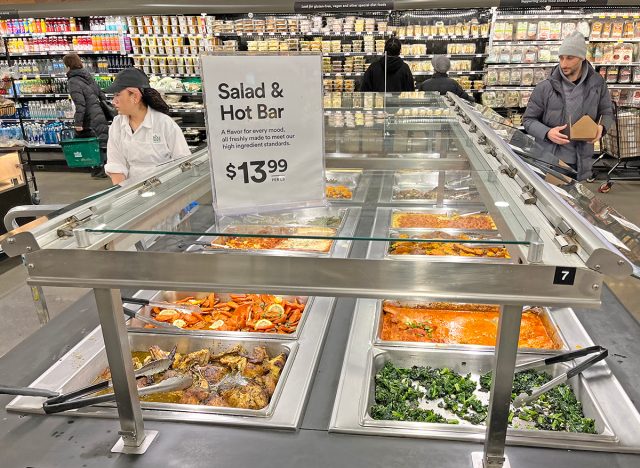
Most large grocery chains have one: the hot bar, a place to get pre-made soups, salads, sandwiches, and other to-go foods. When you step into the prepared foods section, you can find a full buffet of options, which seems like a great idea for someone who needs to grab a quick bite.
Convenient? Definitely. Reasonably priced? Not really. Up to $13.99 per pound in some locations, a box of food from this section can cost as much as sitting down at a restaurant to eat. A TikTok video that went viral in April showed a customer who filled up her box, thinking it was going to cost around $10. But, at checkout, the total rang up much higher: $26. “I could’ve literally did DoorDash,” the poster said in the video.
The high price isn’t necessarily justified by its quality, either. While you may assume that these foods are prepared fresh on site, that no longer appears to be the case. According to Eating Well, the retailer mostly closed down its in-store kitchens in 2017 and moved food preparation off-site. In other words, the offerings you see now are generally made elsewhere, then transported, reheated, and then served.
Fresh Fish
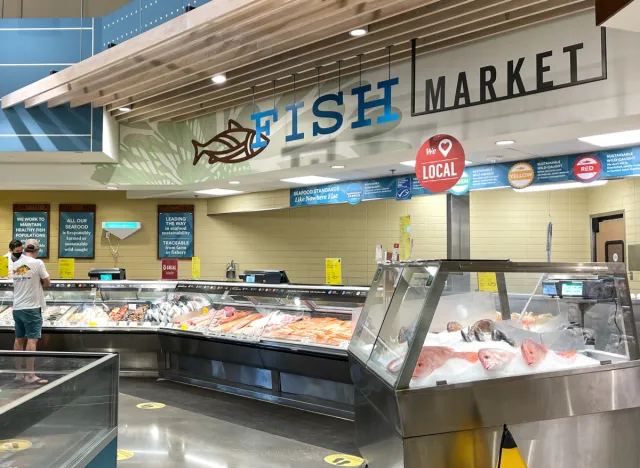
The seafood counter at Whole Foods is probably one of the best, thanks to its “responsibly farmed” policies, which requires traceability to the source of the fish and third-party certification of suppliers to meet the company’s standards. However, if you ask the fishmonger to cut you a piece of salmon, you’d do well to inspect it first. If it looks old, skip it—it may have been sitting in the case for a few days.
One professed regular Whole Foods shopper took to Reddit, complaining that “on at least 50% of occasions, I find myself wondering if the fish is fresh.”
A self-described fish-counter employee responded: “Distributors will send us old fish all the time and we either send it back or we sell it. That means that we sometimes sell some old shit not gonna lie. For fish going in the case, freshness and acceptability of sale is a matter of what we deem the quality, it isn’t the magic 5 day expiration.” The employees may judge the quality to be sellable after a few days, but that doesn’t mean you should buy it. You can opt for frozen fish instead, which is likely to be fresher once you thaw it yourself.
Pre-Cut Produce
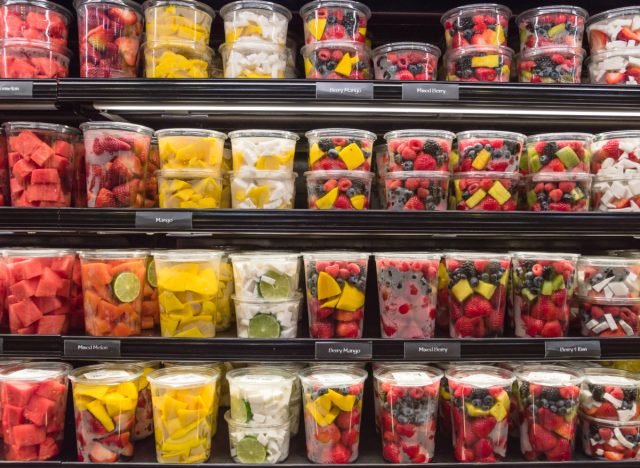
One of the easiest ways to burn cash at Whole Foods is to add a container of pre-cut fruits or vegetables to your cart. You’re paying an upcharge for the convenience, but the cost is steep. One customer recently posted a photo on Reddit of a modest container of mixed fruit that cost nearly $15. “The pricing on whole foods prepped fruits is a huge mystery to me,” wrote one commenter. “I can buy a whole pineapple for $2.28, a large package of blueberries for $5.50, a mango for $1 from Walmart,” added another. “Not sure what else is in there… But that is already enough for 3-4 of these cups for less than $10.”
Conventional Produce
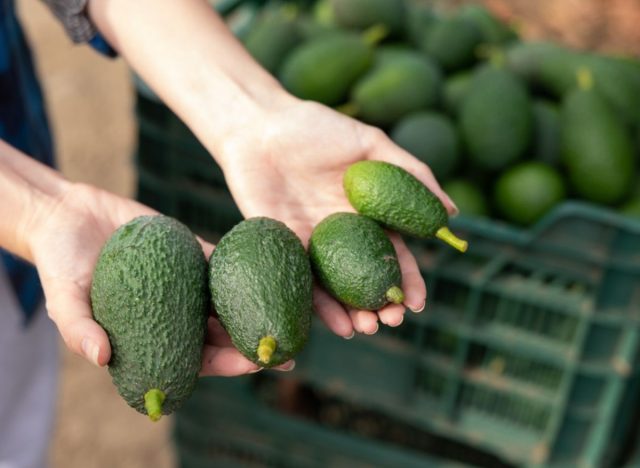
There are certainly reasons to buy organic when you’re shopping for produce, like minimizing your intake of pesticides and supporting a sustainable environment. When picking up strawberries, spinach, and other foods that are most susceptible to pesticides, it might be worth the premium price tag.
However, it’s probably more cost effective to shop elsewhere for non-organic foods that typically have minimal pesticide residue, like avocados and carrots. Customers see significant price hikes on conventional produce at the Amazon-owned market compared to low-cost grocers like Trader Joe’s and Aldi. “WF jacks their prices, even for conventional produce,” wrote one self-described former Whole Foods employee on Reddit. Since the difference in nutrition is minimal, you might as well save these few extra dollars where you can.
Bulk Nuts
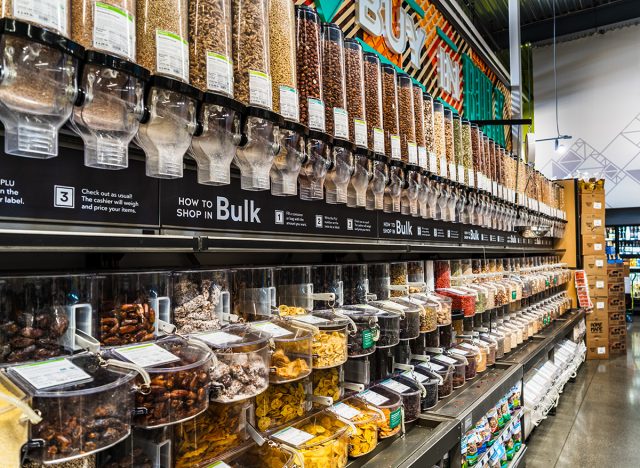
In the bulk department, you can bag your own grains, flours, beans, spices, nuts, and more. It’s a great way to only buy what you need, and you can find some deals in this section. However, some types of nuts in particular can be quite expensive. Shelled pistachios cost as much as $16.79 per pound in some locations, and macadamia nuts can be upwards of $19.99 per pound. Of course, you can choose to still buy a small amount and eat them sparingly, or you could just find a local store that might sell them cheaper. “Nuts that are $9.99 a pound at WF are $5.99/lb at my local market, and sometimes cheaper at Aldi,” wrote one commenter on Reddit.
Whole Foods 365 Brand Dairy Milk
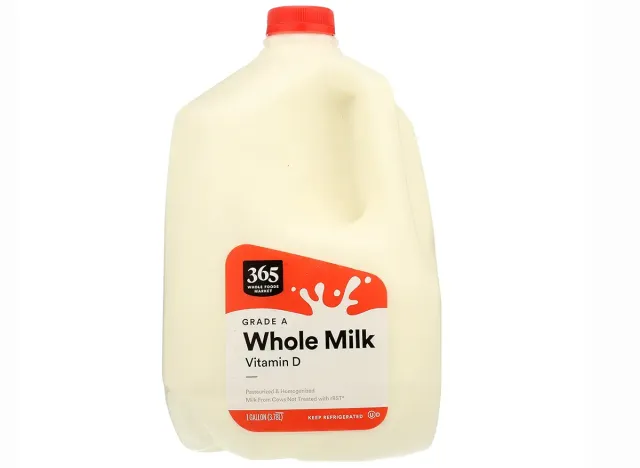
Top-of-the-line organic dairy milk is in ample supply at Whole Foods, with brands like Horizon, Organic Valley, and Maple Hill Creamery ranging about $6 to $8 for a half gallon. If you’re looking for something a bit more affordable, however, the retailer also sells milk under its house brand, 365, which costs a few bucks less.
Lately, however, customers have complained about the quality of the 365 brand milk. Several shoppers on Reddit have commented on its “odd taste” and tendency to spoil quickly. “It varies between a strong plastic taste and just tasting like it’s about to spoil even when the date is 10 days out,” wrote one commenter. “We will not buy milk at WF anymore,” griped another customer. “It is the 3rd time that the milk goes sour days before its expiring date.” The same poster added, “We do not have that problem with any other types and or/brands of other milk.”
Rotisserie Chicken
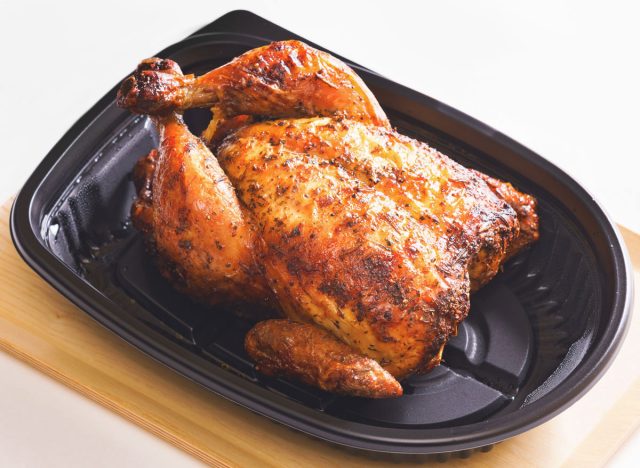
Buying a fresh, fully-cooked chicken at the grocery store is one of the best ways to save time on cooking, and if you know how to use it well, just one bird can go a long way. But you definitely won’t save money if you pick one up at this premium market. A classic rotisserie chicken here is $9.99, and if you want it organic, it’s $13.99. The cult-favorite rotisserie chicken at Costco costs about half as much and tastes better, according to a recent taste test by Eat This, Not That! “Doesn’t stand out like some of Whole Foods other products,” wrote one Amazon reviewer. “Not as good as Costco, more expensive.”
Croissants
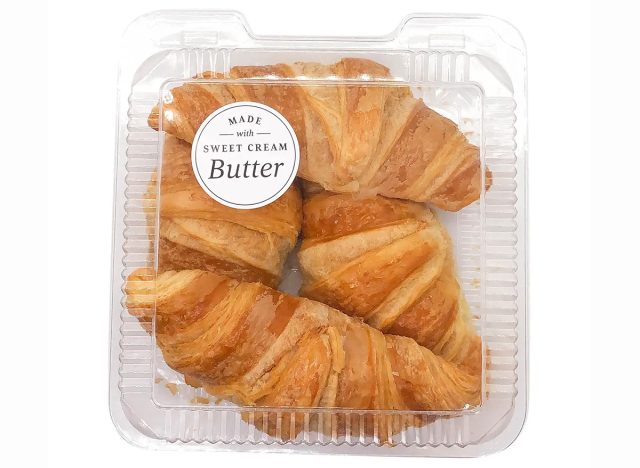
Whole Foods’ bakery is truly a treasure trove of high-quality cakes, pies, cookies, and pastries. That said, if there’s one basic bakery item that you should buy somewhere else, it’s the croissants. While customers will admit that they’re tasty, they also wish they were cheaper. “They are expensive for what you get,” wrote one Amazon reviewer. A box of four laminated pastries costs over $7. Meanwhile, you can get a full dozen for just $6 at Costco. Instead of paying more for less on these, why not put that money towards your next Berry Chantilly Cake?









